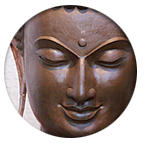 Generative practices are designed to develop the inner qualities of wisdom by moving outside our normal boundaries, expanding the ways in which we typically see and think. Where stillness meditation is an undoing by quieting and pacifying our thoughts, generative mediation is a doing by actively generating positive emotions and thoughts. These practices deepen intent. They form and strengthen the mental pathways that lead to clarity of mind. Practiced regularly, they can be truly transformative.
Generative practices are designed to develop the inner qualities of wisdom by moving outside our normal boundaries, expanding the ways in which we typically see and think. Where stillness meditation is an undoing by quieting and pacifying our thoughts, generative mediation is a doing by actively generating positive emotions and thoughts. These practices deepen intent. They form and strengthen the mental pathways that lead to clarity of mind. Practiced regularly, they can be truly transformative.
Visualization
Effective visualization requires a very concentrated mind. In it, we systematically create a mental image of a figure—such as the Buddha or the syllable Om—beginning at the bottom, then slowly constructing it bit by bit, until we reach the top. We do no analysis; we simply envision the clearest, most detailed image possible. In the process, we are visualizing the qualities these figures represent, and in so doing help generate those qualities within ourselves.
Visualization meditation is very important in Vajrayana Buddhism. It can be very meticulous. For instance, we might visualize detailed figures of bodhisattvas who have multiple faces and arms, intricately ornamented and colored clothing, and inhabit elaborate environments. This degree of detail is essential, as it mirrors the complexity of our minds. Because each detail also has a deeper meaning, it serves as a mnemonic, helping us remember and internalize the teachings.
Loving Kindness Meditation
Loving kindness meditation cultivates our emotional ability to sincerely desire other people’s welfare and spiritual wellbeing. Through it, we internalize a true understanding that everyone both wants and deserves unconditional love. In the process of generating that love we help release others from suffering.
We begin by thinking of someone who has been very kind to us, who has protected us, and recognize all the ways in which they have helped. Most often, the purest example is our mother, who by the very act of giving us life and sustaining it—at the cost of her own pain—embodies unconditional love. Embracing the sensation of unconditional love, we become completely infused with it, until we, too, want to spread it. Over time, our circle of love extends to more and more people.
Prayers
Prayers are an active reminder of the teachings; they generate positive energy for others while focusing the mind and reinforcing the precepts. They center on a good quality, one we all seek. Thinking of a bodhisattva who embodies that quality, we find an example of success, suggesting that we, too, may be able to achieve that quality one day. We recognize our own potential, the effectiveness of teaching and practice, the importance of our connection to our teacher. We understand that we too can succeed—and that that success is for the benefit of others, not ourselves.
Music and Singing
Singing can be prayer set to music. As such, it can provide the benefits of prayer: reinforcing the teachings, channeling admiration for specific qualities of mind, expressing confidence in our own ability to achieve those qualities through practice—and above all, wishing well for others. The addition of music adds a deeper emotional engagement, strengthening the intention of the words and adding resonance to their content.
Work and Volunteering
To achieve enlightenment requires both the brain and the heart: If wisdom is the flame of the fire, merit is the fuel. While all the morality teachings generate merit, work and volunteering are among the best ways to put those concepts into practice. These are a physical manifestation of generosity, giving our time, our energy, our good intention—in short, unselfishly giving of ourselves to others.

LIVE BETTER
Life is complex, puzzling and often painful.
Sometimes it seems there must be a better way
to manage—and there is. It is as simple as looking
at a problem through a different lens.



